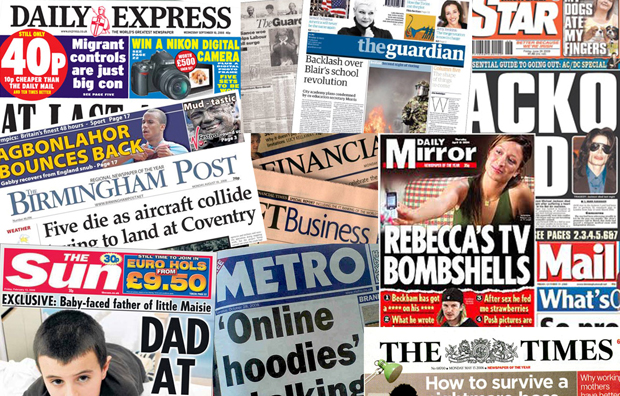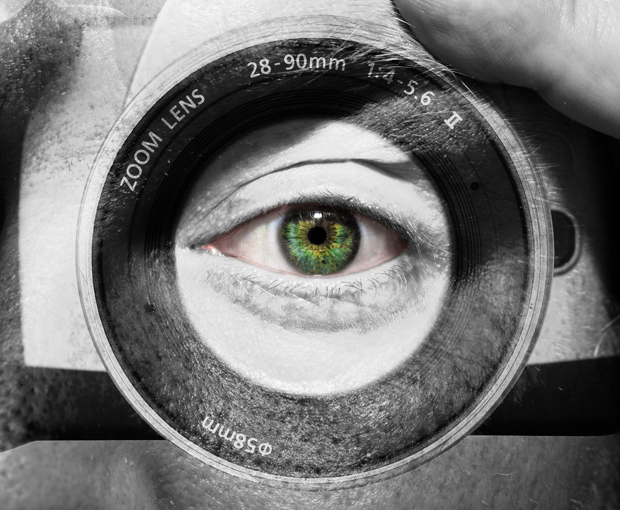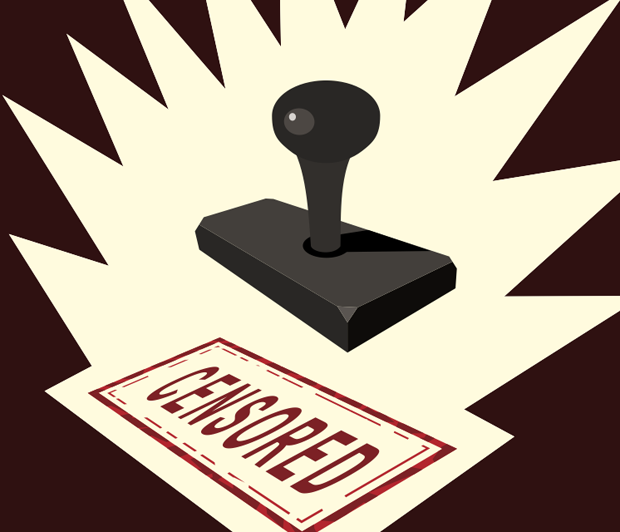9 Oct 2014 | News and features, Politics and Society, United Kingdom

It’s the newsagents I’ll miss the most. There are few more reassuring signs of civilisation than a well-stocked newsagent.
The tiny shop next to my local London underground station lays out a trestle table every morning, upon which sits a vast range of papers; the UK nationals, of course, and the local north London papers. And then Irish local and regional papers. The Kerryman, the Anglo-Celt, the Roscommon Herald, the Kilkenny People, the Kildare Nationalist, like Patrick Kavanagh’s barge “bringing from Athy/ And other far-flung towns mythologies.”
Newspapers are enthralling, odd things. The idea that every day a short novel’s worth of text is somehow corralled into print is strange and brilliant. And yet, gather more than two print journalists, even from still-profitable publications, in a room, and talk will soon turn to managed decline of the newspaper industry in Europe and the United States, and how the industry must be more like Buzzfeed, or less like Buzzfeed (it is mandatory to have an opinion on Buzzfeed).
This week, a group journalists gathered in the House of St Barnabas in London’s Soho, to discuss whether or not Britain gets the press it “deserves”. The panel, chaired by Miranda Sawyer of the Bug Consultancy, featured journalists Sophie Heawood and Matt Kelly, and media analyst Douglas McCabe. Heawood, who recently took up the dream gig of The Guardian newspaper’s weekend magazine main column, spoke interestingly about her path into broadsheet journalism via music writing (proving the truth in the advice given to all aspiring writers, Heawood spotted the gap in The Guardian’s coverage of the London grime music scene and inserted herself in it). Heawood, who gave up a column with Vice for her current Guardian slot, pointed out the irony that while we all seem to be grieving for newspapers, she still saw it as a move up in the world to go from new media to old.
McCabe pointed out that while we grieve, lots of people are still going out every day to buy a newspaper. Eventually they may not, but this decline may not happen as soon as we think.
The venue, a candlelit chapel, lent the night a funereal air. Certainly the short speech given by former Daily Mirror features editor Kelly felt a little like a eulogy. Kelly talked about his time as an indentured apprentice on a small Merseyside paper 25 years ago, earning £4,000 a year, of learning the ropes of court reporting, local government, all the dull but necessary things vital to local journalism. He moved to the Liverpool Echo and then the Daily Mirror, where he started on a salary of £42,000 in 1996 (a number that drew gasps from the young audience, which, one suspected, contained quite a few people who were in the apparently common position of being “full-time journalists” who don’t really get paid).
The Scouse journalist recalled glorious times of fully-staffed newsroom where “the budget” was only something politicians needed to manage. He claimed to have had no idea how much money he spent on journalism over the years, but he had spent thousands on keeping undercover reporter Ryan Parry in Buckingham Palace for two months in 2003, a story which sticks in the brain mainly because it’s when we first found out that the Queen keeps her cornflakes in Tupperware. The story was a success: Daily Mirror circulation spiked by 25% for three days after initial publication.
This, Kelly suggested, does not happen anymore: once your story goes out on the web, it’s everywhere. That bounce is lost. But that was not the real concern, he suggested: the real concern was that the route through journalism he took was dead as a model, that young reporters were not learning the basics, and that the metric-measuring web would always lead people to favour clickbait over difficult stories. So do we get the press we deserve? No, suggested Kelly. We get a significantly better press than we deserve. Analytics appeared to show that people only really wanted to read titillation, and for years journalists and editors had kidded themselves that people admired them for their hard-hitting journalism.
This led Kelly to his conclusion: the public doesn’t even deserve the British press. Hacks work hard on genuine stories, and the public doesn’t read them.
It’s a humbling, sobering thought for a trade not known for humility or sobriety. All that work and there you are, utterly unappreciated. Ask the average person not engaged in the media to name a great scoop. They will say Watergate. Ask them for another, and they might say MPs expenses. Ask what papers, or even what journalists were responsible for them, and the people who have seen All The President’s Men might be able to answer.
For most people, journalism and the media are kind of nebulous background noise. In the past, you had some kind of reason why you bought a particular newspaper, even if that reason was just that you always bought that newspaper. Increasingly though, people are barely aware of what publication they’re reading. Ask a recent graduate what site they read every day, or what their preferred news source is, and they will say be more likely to say Twitter than The Guardian. Which is why that publication and others are scrabbling to find new ways to bond with people beyond encouraging the reader going to a shop and buying a newspaper.
This fragmentation brings up the question of whether newspapers will maintain their influential position in society (be that good or bad) and if not, whether this will affect arguments for press freedom as distinguishable from everyday rights and liberties. We witness versions of this question from time to time: when local bloggers are excluded from council meetings because they are not accredited press, even if they are the only people in the area willing and able to cover the proceedings, for example. In the past, papers have been defensive of their position (many journalists can still get a scarcely believable amount of contempt into the word “blogger”) but in the post-Leveson world, in Life After Brian, it’s apparent that there is an interest in ensuring that press freedom and free speech are universal.
Explore the latest issue of Index on Censorship magazine for discussion on the Seeing the future of journalism: Will the public know more? In print, online or on your iPad.
This article was posted on 9 October 2014 at indexoncensorship.org
25 Sep 2014 | News and features, Religion and Culture, United States

(Photo: Shutterstock)
For us jaded Europeans, the United States’ first amendment, with its simple pledge that the government will keep out of the business of religion and censorship, seems as stubbornly, oafishly American as Hulk Hogan. It’s a loud tourist with a bumbag, wasting his money in an Angus Steakhouse; it’s Burt Reynolds’ moustache; it’s Jane Russell’s specially-constructed brassiere; it’s brash and unsubtle and does not do nuance.
Which is why we’re so ready to accept the idea that a US court has decided that the first amendment concept of free speech trumps all, even sexual harassment. Especially if that court is in Texas, the bit, we imagine, that makes the rest of the United States look sophisticated.
“Texas court upholds right to take ‘upskirt’ pictures”, said the Guardian, while the Independent tweeted “You’re legally allowed to take upskirt pictures in Texas because it’s ‘freedom of expression’” (note the scare quotes).
The stories under the headlines concerned a ruling by the Texas Court of Criminal Appeals in a case concerning a man named Ronald Thompson.
Thompson had been caught taking pictures of children and women at a water park in San Antonio, focusing on what I believe is called the “bikini area”. Thompson reportedly tried to delete the photos as he was apprehended. He was indicted on 26 counts under Texas’ “improper photography or visual recording” law.
Thompson appealed the indictments on the grounds that the law was incompatible with the first amendment. The court agreed with him, leading to the headlines across the world. Most reports, including, it should be said, the American ones, went hard on the “upskirt” or “creepshot” angle, declaring it was now entirely legal to well, be a creep with a camera in Texas.
Is it really? Well, sort of, ish.
The judgement issued by the court is a genuinely fascinating read for anyone interested in free expression, far from the gun-toting, sexual harassment-ignoring, good ole boy decision it has been represented as. It involves discussion about what constitutes the public realm and the nature of consent. It goes into some detail as to whether the act of photography is in itself creative expression, and decides it is.
Some commentators, such as Salon’s Jenny Kutner have picked up on the wording in the judgment suggesting that “Protecting someone who appears in public from being the object of sexual thoughts seems to be the sort of ‘paternalistic interest in regulating the defendant’s mind’” as evidence of a court being more interested in a pervert’s right to perv than a woman’s right not to be harassed.
But it’s actually a point well worth making. Courts and governments cannot be involved in what people find sexually arousing in their imaginations; it’s only if actions cause harm to others that the law should intervene.
This is not, then, a ruling taken lightly. Rather it reviews very seriously a badly written law.
The law itself, section 21.15 of the Texas Penal Code, reads as follows:
(b) A person commits an offense if the person:
(1) photographs or by videotape or other electronic means records, broadcasts, or transmits a visual image of another at a location that is not a bathroom or private dressing room:
(A) without the other person’s consent; and
(B) with intent to arouse or gratify the sexual desire of any person;
The “bathroom or private dressing room” exclusion seems weird, but is only there because the next clause specifically refers to bathrooms and private dressing rooms, presumably drafted in light of some kind of Chuck Berry scenario (the guitar legend was accused of secretly taping people using bathrooms in his Missouri restaurant).
The problem is that this is far too broadly drawn as a law, but also weirdly specific. What it does not address at all is what might be a reasonable expectation of privacy in public: it is not a serious argument to suggest that one must always actively give consent to being photographed in public space. But it is reasonable to expect that no one should be taking upskirt pictures of you: the judgment acknowledges as much, specifically mentioning upskirt photographs as an “intolerable” breach of privacy.
The weird specificity comes with the “sexual desire” bit; why is this kind of thought worse than any other? Shouldn’t the focus be on the breach (or not) of privacy, rather than what thoughts the images might lead to? Apart from the argument over whether photography is an act of expression, it is this clause that raises free expression problem with the law: put simply, the human mind is capable of eroticising pretty much anything. Any kind of picture could “arouse or gratify the sexual desire of any person”. Once again, the focus is in fact taken away from the act of breaching privacy and towards the act of expression.
In spite of initial appearances, the Texans have done a good thing here. The state will now have to come up with a law that properly balances privacy and free expression, rather than giving just piecemeal thought to either concept.
First amendment cases often solicit astonished responses. But more often than not, a first amendment consideration isn’t just free expression rolling into town in its monstrous, burger chewing, gasoline drinking, Okie from Muskogee way. No. More often than not, the first amendment forces some real thought and analysis to take place in public life.
This article was posted on Thursday, September 25, 2014 at indexoncensorship.org
4 Sep 2014 | News and features, Nigeria, United Kingdom

Lady Apostle Helen Ukpabio was banned from travel to the UK in April 2014
Lady Apostle Helen Ukpabio is a pastor, author, film producer, actress, artist, composer and singer and founder of Liberty Foundation Gospel Ministries, based in Calabar, Nigeria. She is also, as one would suspect of someone with such a CV, possessed of admirable chutzpah.
It emerged this week that Ukpabio is threatening to sue the British Humanist Association to the tune of half a billion pounds (to be precise, £500,010,500 in costs and compensation). Ukpabio claims that the BHA, and their companions at the Witchcraft and Human Rights Information Network, have defamed her. Her specific claim against the BHA is that an article on its website claimed she believed that noisy babies may be possessed by Satan.
The article, which appeared in July 2009, says that Ukpabio wrote in her book, Unveiling The Mysteries Of Witchcraft, that “A child under two years of age that cries at night and deteriorates in health is an agent of Satan”.
In this, the article is mistaken. Ukpabio’s book does not seem to contain this sentence. Rather, under the heading “How To Recognise A Witch”, Ukpabio writes: “Under the age of two, the child screams at night, cries, is always feverish suddenly deteriorates in health, puts up an attitude of fear, and may not feed very well.”
This is not, you will see, the same. But a misquote is one thing; a libel is quite another.
The placing of this misquote at the centre of Ukpabio’s claim is based on the premise that it is fundamentally worse to accuse a child of being possessed by a devil than it is to accuse a child of being a witch, or possessed by a witch, or a vampire (as mentioned in the initial legal threat).
This is the stuff of a particularly heated thread on a Dungeons and Dragons board. It is not an argument that has a place in a chamber at the Royal Courts of Justice, in spite of that building’s Gormenghastish architecture.
That’s not the only reason the case shouldn’t come to court: the article in question was published over five years ago, apparently without ill effect on the lady Ukpabio. She admits to not having seen the article on the BHA website until earlier this year.
Her complaint, in reality, is not about the 2009 article, or the difference between satanic possession and witchcraft. Ukpabio’s underlying complaint is about a campaign to have her banned from the country in April 2014. It is the coverage of her controversial trip to Britain in April that her lawyer claims caused her to suffer reputational injury.
So why, rather than attack the numerous news outlets who reported negatively on her UK visit, during which a London venue cancelled her booking after being alerted to her witchfinding and exorcising activities, is she instead pursuing threatening humanists?
At the World Humanist Congress in Oxford last month, Nigerian delegates such as the brilliant, brave Leo Igwe, spoke passionately about preachers and witchfinders like the Lady Apostle. While in Britain “militant atheist” has become a term of abuse associated with the gauche tweets of Professor Richard Dawkins, in Nigeria, a forthright approach to religion and the abuses carried out in its name is a necessity. Humanists there are not fighting semantic battles; rather, they are engaged in a real struggle to save children and vulnerable people from accusations of witchcraft and possession: accusations that could lead to them being thrown out of their homes, beaten and even killed.
What scant support Nigerian activists receive comes from the international atheist and humanist community. While I would not cast doubt on western humanists’ solidarity with their Nigerian comrades, a costly court case would make anyone think twice before getting involved in faraway struggles again.
To grant Ukpabio’s claim any credence would be to severely inhibit the struggle against dangerous superstitions in Nigeria and elsewhere in Africa. To even get involved in an legal argument over whether satanic possession is worse than witchcraft would grant a glimmer of legitimacy to the abuse of children in the name of God. That is reason enough for the English High Court to dismiss the Lady Apostle’s ludicrous lawsuit.
This article was posted on Sept 4, 2014 at indexoncensorship.org
28 Aug 2014 | Europe and Central Asia, News and features

(Image: Nemanja Cosovic/Shutterstock)
I’m on holiday in Ireland, and taking a break from standing up for people’s rights to misattribute quotes to Voltaire and Orwell. This is what people who normally go on about civil liberties battles do on holiday; we revel in the dark side, and engage in orgies of frightful behaviour. For two weeks in August, defence lawyers who normally fight the good fight lock people in cupboards and throw away the keys; anti-surveillance campaigners retreat to their hides high above the city, and just…watch. Digital rights folks take down physical notes of all your Facebook statuses. I once spent a delightful summer phoning people at random and then telling them to shut up when they answered the phone.
It’s a wonderful release, but for understandable reasons, we don’t talk about it. It’s the prime directive of the League of Sanctimony: what happens in those two weeks in August must remain hidden from the world.
Until now, that is. Having grappled with the crippling irony of concealing the truth from Index on Censorship readers, I have decided that you have a right to know about everything I would have banned without a second thought, if only during the last bit of August. In no particular order, here we go:
Newspaper holiday reading lists. Dear writer/reporter/critic: you’re either lying about all those books you’re going to get through during your delightful few weeks in Tuscany/Cornwall/west Cork/Thorpe Park, or you’re telling the truth and making me feel inadequate.
Rainy holidays: Yes, I know I shouldn’t really complain about going to Ireland and experiencing heavy precipitation. I don’t care. I’m doing it anyway.
People who can’t write (of whom there are many).
People who can write better than I can (of whom there are many).
People who think pointing out split infinitives makes them look clever. It doesn’t. Split infinitives are perfectly fine. Just don’t ask me why.
People who are good at explaining grammar and syntax. See above.
People who are good at explaining grammar and syntax but then end up allowing anything, cheerily proclaiming “The thing is, language is evolving all the time.” For God’s sake, make a commitment, man.
Really terrible internet memes. David Icke, former Coventry City goalkeeper turned conspiracy theory bother no 1, is the master of these. Look at this, for example. It’s just a picture of a man with snarky words written over it. That’s not a meme.
Any article in print or online which sets out to prove that a current conflict proves that the writer was correct in his or her position on a previous conflict. Thanks. Helpful.
LinkedIn. I still don’t understand. Still.
The word “Listicle”. What’s wrong with “list”? Or “article”? I could even be happy with “list article.”
Lists. Hang on…
Defensive articles about why one form of entertainment is EVERY BIT AS VALID as other forms of entertainment. Video games are video games. Comics are comics. Neither are novels. Move on.
Those public service “poems” on the London Underground. They have been sent to torment all right-thinking people. Read this, and despair for all of us.
I could go on, possibly forever. But it wouldn’t matter a damn. No one in their right mind would take me seriously. It’s just the furious venting of a cranky old man, shaking his fists at the clouds. And yet, every day, censors, religious or moral or autocratic, demand to be taken seriously.
They contend that they are uniquely qualified to say what others can and cannot see or hear or read. Worse, they tell us they are censoring for our protection. They can read a blasphemous book, or watch a pornographic film, and decide soberly what effect it will have on society. Whereas if the likes of you and I went near these things, the entire world would be transformed into something resembling Ken Russell’s The Devils in about 15 minutes. They think we’re impressionable. They think we’re gullible. They think we’re children.
As the holidays come to a close and we reluctantly switch our brains back on to face the coming winter, let’s not block out the calls for censorship: that, of course, would be hypocritical. But perhaps we can turn the tables on the cries of the censors, smile politely and continue about our grown-up business.
This article was posted on August 28, 2014 at indexoncensorship.org




